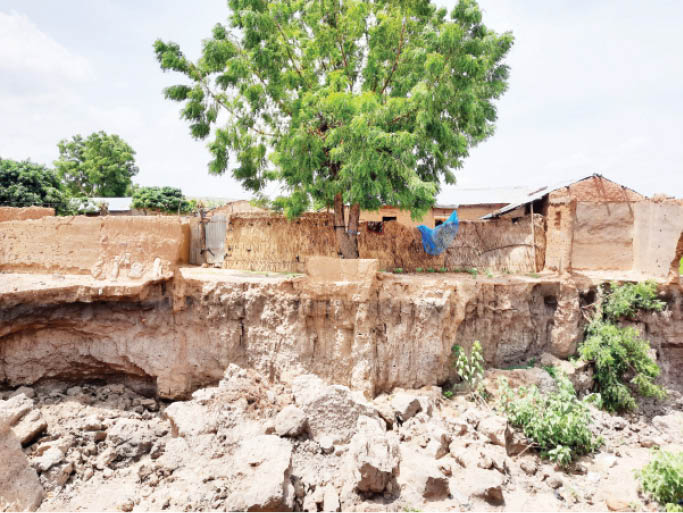How ecological office tackled 40-year erosion in Kano
Residents of Ladanai and Tsamiya Babba towns in Nasarawa LGA of Kano State are now relieved after the Ecological Project Office (EPO) carried out intervention works on gully erosion ravaging the communities. A resident, Malam Shamsu Adam, commended the federal government through EPO for the intervention. He said, “Truth be told, the federal government has […]

A house on the verge of being consumed by gully erosion
Residents of Ladanai and Tsamiya Babba towns in Nasarawa LGA of Kano State are now relieved after the Ecological Project Office (EPO) carried out intervention works on gully erosion ravaging the communities.
A resident, Malam Shamsu Adam, commended the federal government through EPO for the intervention.
He said, “Truth be told, the federal government has done us well by executing this project and thus averted the frequent deaths of our children often swept away during the massive flooding and also the loss of property in times past.”
Another resident, Abdullahi Awwal, added, “Now we are living in peace and have returned to our ancestral lands.”
Daily Trust learnt that the intervention ended 40 years of residents of the communities being confronted with the menace of erosion and flooding.
The Permanent Secretary (EPO), Malam Shehu Ibrahim, who visited Kano State on Monday, as part of his ongoing tour of ecological projects across the country, expressed satisfaction with the work done by the contractor.
He said the scope of the project included a 1.5km accelerated gully erosion work with a 1.2km roadside reinforcement drainage, 1km collector drains with over 200,000sq meters reclamation of eroded land at Ladanai.
Also, erosion and flood control works at Tudun Murtala Grave Yard in Nasarawa LGA were carried out and residents disclosed that before the intervention, the corpses of their dead relatives were often washed away during flooding.
Ibrahim further revealed that flood control works to link the main water channel and the Kwargwan pond drainage, concrete and road reclamation works covering about 7km in Daura, Kastina State, were also inspected, as well as those at Shargalle and Sirika in the same state.
The permanent secretary said, “The locals in the communities can now return to their lands and farming businesses after decades of being chased away due to the ecological challenges.”
While on a courtesy visit to the Emir of Daura, HRH, Alhaji Umar Farouk Umar, in his palace, the monarch thanked the federal government for intervening in the ecological challenge, particularly in reclaiming the Kwargwam pond and the extensive 7km drainage and road improvement works in the community.
He assured the permanent secretary that the project would be well maintained.
In addition, the EPO is constructing a facility to control industrial pollution at Bompai, Sharada and Challawa areas in Kano, where hundreds of industries are operating.
Malam Ibrahim, who was conducted round the facility during his inspection of ecological projects in Kano, noted that government was committed to the completion of the project and will soon award phase 2.
According to a statement by Mrs Olotu, Ibrahim expressed satisfaction over the work done by the contractor, who stated the project was presently at about 95% completion.
Malam Ibrahim also said the complaint for the intervention came from the state government, the Kano State Emirate Council and the industrial community for an urgent intervention to salvage the imminent environmental hazards within the area.
The permanent secretary said the EPO would synergise with the industrialists and the state government on how best to manage the project so that there would be continuity in the management and maintenance of the facility.
The contractor, Alhaji Sanusi Turaki of ALPS Global Link Ltd, said the project implementation was the first of its kind in Nigeria, explaining that the components included piping with 325 chambers constructed, a water treatment plant for the collection of raw effluent from the holding reservoir, and incinerators to burn the solid particles collected from the physical treatment and surroundings and convert them for economic benefits.
